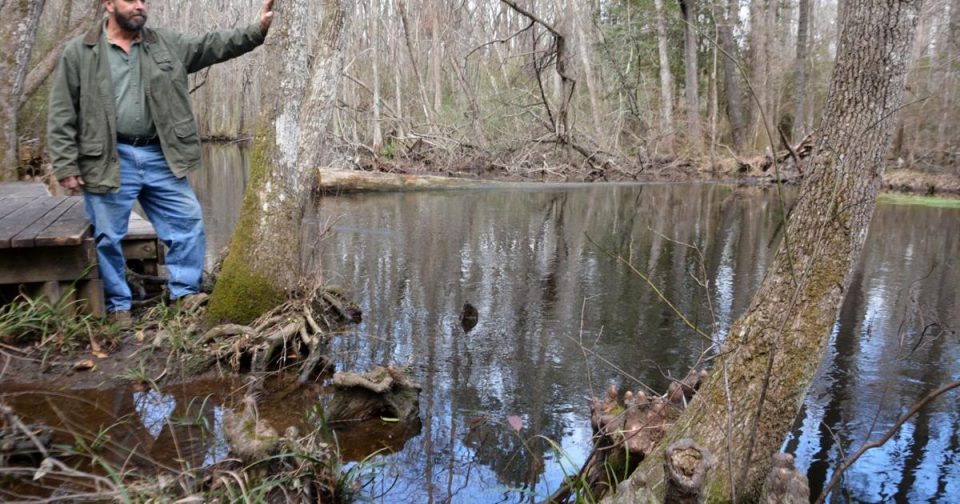The letter from the federal Environmental Protection Agency is reminiscent of so many letters the S.C. Department of Natural Resources and other clean-water advocates have sent to DHEC over the past decade, spelling out the problems with the 2010 state law that gave away the farm to mega-farmers.
Unlike those other protest letters, though, this one carries the weight of law. Part of the EPA’s job under the Clean Water Act is to approve or deny state water-quality standards. Alerted by environmental lawyers, the EPA has belatedly reviewed the South Carolina Surface Water Withdrawal, Permitting, Use and Reporting Act of 2010 — and found it wanting.
In a May 20 letter to Attorney General Alan Wilson and Myra Reece, director of DHEC’s environmental affairs division, EPA Regional Administrator Daniel Blackman said the law was “Not based on a sound scientific rationale” and does “not provide for the attainment and maintenance of downstream” water quality standards, as required by federal law.
As a result, the Department of Health and Environmental Control can no longer use state law for issuing certain federal environmental permits; it can’t even refer to the state law as “protective stream flow criteria” or “flow standards,” Mr. Blackman wrote, because doing so “may create confusion and give the impression that the provisions” can be used for Clean Water Act standards.
The federal action marks the sharpest rebuke to date of a law legislators claimed was designed to protect S.C. rivers from overuse but that in reality opened the door for factory farms to suck our rivers dry. Under the law, almost anyone who wants to withdraw more than 3 million gallons per month from our streams, rivers and lakes has to obtain a permit, through a process that considers the “anticipated effect” the withdrawal would have on fish, navigation, wildlife and recreation.
But the law doesn’t apply to large agricultural users, who only have to register their planned withdrawals with DHEC. The agency can’t say no if the withdrawal comports with a mathematical formula of river flow that’s based on annual — not monthly — averages and that the EPA said lacked a “sound scientific rationale.” And a farmer retains those water-withdrawal rights forever.
The law was based on the sensible idea that we need to limit industrial use of our water capacity in order to preserve this increasingly limited public commodity for farms, since farmers feed us. But it goes too far, by allowing them to claim pretty much any amount of water capacity they want — without even demonstrating that they need it.
It took only two years for Michigan-based Walther Farms to discover the giant loophole: It bought thousands of acres of farmland in the fertile Edisto River basin and claimed the right to withdraw 9.6 billion gallons of water a year from the South Fork of the Edisto, the longest, free-flowing blackwater river in North America. Environmentalists complained that the narrow stream couldn’t survive such large withdrawals during the drier summer months, but they had little recourse because of the megafarm loophole. The potato-chip farm eventually demonstrated that it didn’t even need 9.6 billion gallons a year when it reached an out-of-court agreement with environmentalists to withdraw no more than 3 billion.
But for nearly a decade, since the farm exposed the loophole, the Legislature has refused to close it. At some point, we have to acknowledge that allowing factory farms to have their way with some of our most important state resources was lawmakers’ intention.
Finally, the EPA agreed with what the Southern Environmental Law Center’s Carl Brzorad tells us was the law center’s central argument: “What is the point of water-quality standards that have these criteria to protect the integrity of our waterways if you’ve got a (state) law that says big ag can just completely suck rivers dry?”
The EPA doesn’t have the power to make lawmakers fix the law. But if the Legislature doesn’t act, the state could start experiencing problems. As Columbia’s State newspaper explains, the EPA decision could interfere with efforts to complete the periodic relicensing of hydroelectric dams, and it could result in delays in federal permits that businesses need.
And of course, there’s the environmental threat, which lawmakers have been ignoring despite mounting complaints from conservationists, water system operators, recreational water users and even other farmers. Allowing megafarms to draw down rivers too much leaves insufficient water to dilute pollutants and depletes oxygen levels, endangering fish and other aquatic animals. The EPA said excessive water withdrawals “will almost certainly result in significant ecological degradation.”
Even before the EPA letter, DHEC had begun a process to rewrite the regulations in question; it is accepting public comments through Aug. 22. Anything the agency can do to reduce the problems will be good. But as Mr. Brzorad notes, “the flaws are so deeply rooted in the statute that there are going to need to be legislative changes.”
We can only hope that the EPA’s sobering action finally prompts our lawmakers to recognize that handing over all of our water rights to a handful of factory farms hurts everyone in South Carolina except those farmers: from other farmers to the people those megafarmers say they’re working so hard to feed with their potato chips and the offerings that are actually nutritious.


